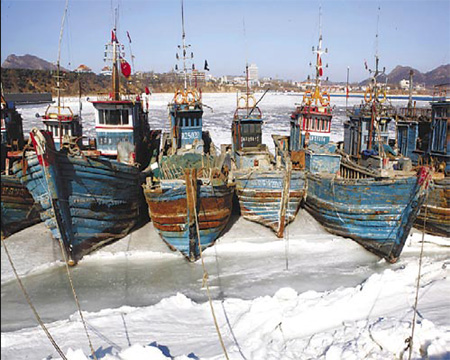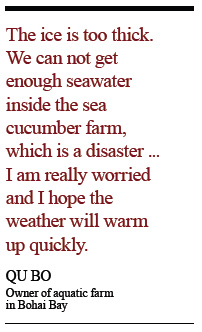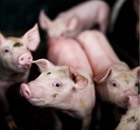Opinion
Deep freeze
By He Na in Huludao, Zhao Ruixue in Laizhou, Wang Shanshan, Liu Ce (China Daily)
Updated: 2010-01-27 07:57
 |
Large Medium Small |
 |
|
Fishing boats are frozen at the harbor of Huludao in Liaoning province. [China Daily] |
 |
|
A tricycle rider ferries residents from Juhua Island across the ice to Xingcheng. [China Daily] |
The sea ice off Liaodong Peninsula, which is to the north of the Bohai Bay, will continue to expand this week but its pace will be much slower than recent days, the National Marine Forecasting Station told China Daily.
As of Tuesday, floating chunks of sea ice in Liaodong extended 37 nautical miles (68 km) from the coast, showed statistics from the station and experts predicted it could reach up to 50 by Friday. The average ice thickness will be 10 to 20 cm, and could be up to 35 cm thick in some areas, said the station.
At Huludao Port, east of Bohai Bay, operators say they have managed to keep the facility operating, albeit slowly, in ice about 5 to 15 cm thick.
"With the help of an icebreaker and tugboat the port is running as usual, although the speed of operations is drastically reduced," said Li Lixin, director of marine environment protection for the Huludao Marine and Fishing Bureau.
Work has also been affected at the busy Jizhou Port. Pilots usually take just two or three hours to navigate boats in and out of the port but that has become about eight hours thanks to the frozen conditions, according to a report published on people.com.cn.
As for Juhua Island, the ice is also an annual event in Huludao. "But a huge cold front hit the city almost one month earlier than usual this year, which was followed by more bad weather, which just made things worse," said Li. "This is the most severe freeze in three decades."
The sea ice has also hit aquatic farms along the gulf coast, which is famous for its scallop and sea cucumber. The sudden cold snap has prevented the fresh nutrient-rich water from getting to the produce, while many farms also face a seawater shortage.
"The loss is expected to reach more than 3.2 million yuan," said Fan Derong, vice-president of the Huludao Marine and Fishing Bureau. "To get more accurate statistics, we have sent staff to villages to investigate door to door. The new loss will be updated several days later."
Jiuzhou Aquatic Farm in Haibin county raises sea cucumbers and about 700,000 turbot, a species of European flatfish. Covering more than 40 hectares (400,000 sq m), it is considered the largest farm of its kind in Xingcheng.
The more they eat, the more excrement they produce, which contaminates the fish pond."
Without enough nutrition, the usual growth period of the fish could be extended by at least three months, he said. This not only means the company has to pay more for water, electricity power and labor, but also means they will not be ready for the peak period to sell fish.
"The thickest ice in my sea cucumber pond is more than 1 meter. Usually our products enter the market at end of March; this year I'm afraid it will be late in April or May. It's hard to estimate our losses but obviously the company will suffer a lot this year," said Men.















